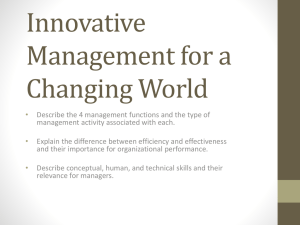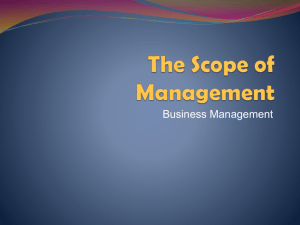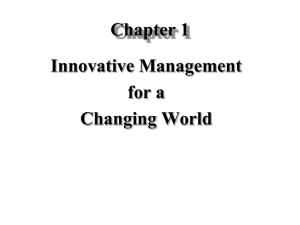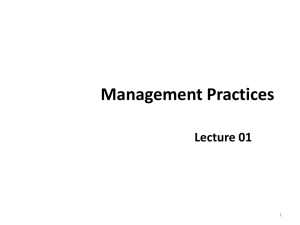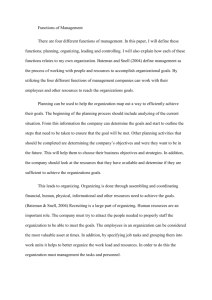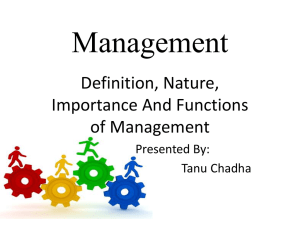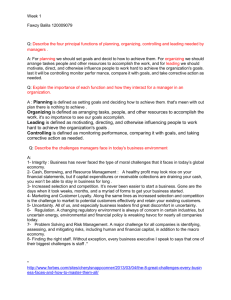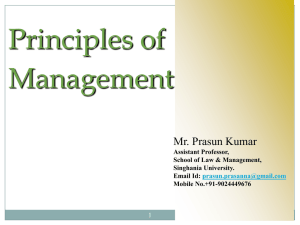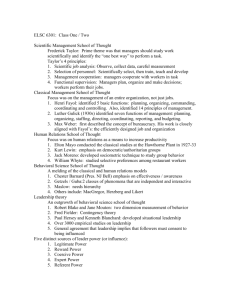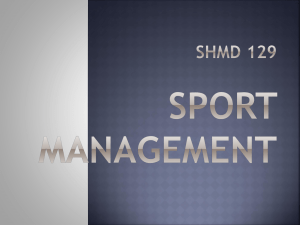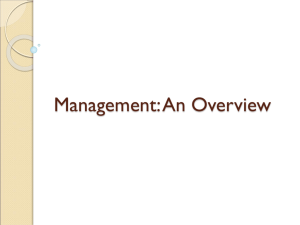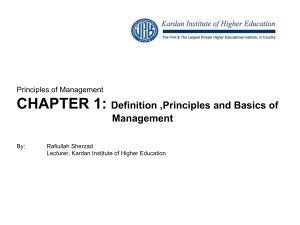MGMT 300 - 2
advertisement
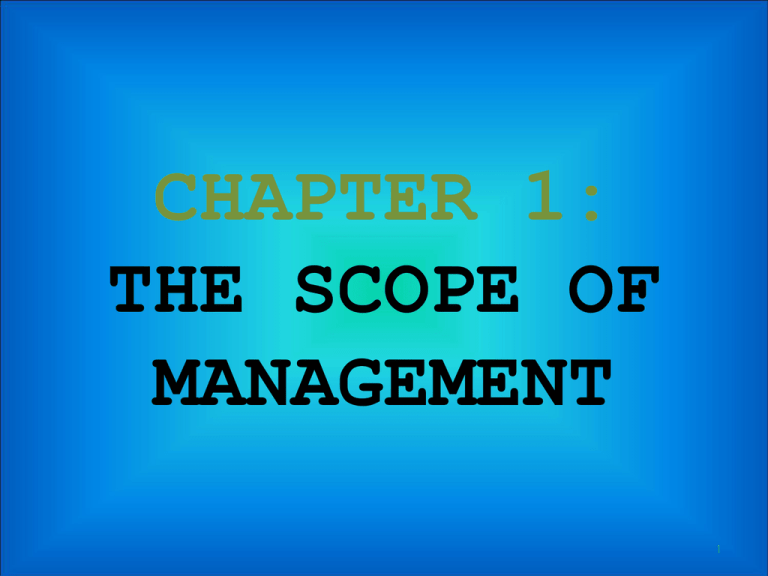
CHAPTER 1: THE SCOPE OF MANAGEMENT 1 WHAT IS MANAGEMENT? Mary Parker Follet • Art of getting things done through other people George R. Terry • Field of knowledge that seeks to systematically understand why and how men work together to accomplish objectives and make these cooperative systems more useful to mankind Donnelly • The process undertaken by one or more individuals to coordinate the activities of others to achieve results not achievable by one individual acting alone 2 WHAT IS MANAGEMENT? F. W. Taylor • The art of knowing what you want to do and then seeing that it is done in the best and cheapest way Lubber Gullick • A process consisting of planning, organizing, actuating and controlling, performed to determine and accomplish the objectives by the use of people and resources. Henri M. Boettinger • An art because like any of the arts, it requires three components: vision, knowledge and successful communication 3 BASIC MANAGEMENT CONCEPT Functional Concept Universality Concept Basic Management Concept Productivity Concept ‘Getting Things done Through Others’ Concept Leadership and Decisionmaking Concept 4 FUNCTIONS OF MANAGEMENT Newman and Summer • Planning, Organizing, Leading, Controlling Luther Gullick • Planning, Organizing, Staffing, Directing, Coordinating, Reporting, Budgeting Warren Haynes and Joseph Massie • Decision Making, Organizing, Staffing, Planning, Controlling, Communicating, Directing Henri Fayol • Planning, Organizing, Commanding, Coordinating, Controlling 5 FUNCTIONS OF MANAGEMENT Planning Organizing Leading Controlling 6 LEVEL OF MANAGERS Top Managers Middle Managers First Line Managers 7 Top Managers Middle Managers First Line Managers SUBORDINATE 8 ROLES OF MANAGERS Interpersonal Roles • Figurehead Role • Leader Role • Liaison Role Informational Roles • Monitor Role • Disseminator Role • Spokesperson Role Decisional Roles • Entrepreneur Role • Disturbance Handler Role • Resource Allocator Role • Negotiator Role 9 MANAGERIAL SKILLS Technical Skills Human Skill Conceptual Skill 10 MANAGEMENT LEVELS TOP MANAGERS MIDDLE MANAGERS FIRST LINE MANAGERS MANAGERIAL SKILLS Human Skills Technical Skills Conceptual Skills (10%) (30%) (60%) Human Skills Technical Skills Conceptual Skills (20%) 40%) (40%) Human Skills Technical Skills Conceptual Skills (40%) (40%) (20%) 11 OTHER SKILLS Basic Knowledge Management Communication Skills Decision Making Skills Skills 12 PLANNING ORGANIZING TO ACHIEVE ORGANIZATIONAL STATED OBJECTIVES MANAGERS PERFORM LEADING CONTROLLING 13 IMPORTANCE OF MANAGEMENT 1 • Critical element in the economic growth of the country 2 • Essential in all organized effort 3 • Dynamic, life giving element in every organization. 14 MANAGEMENT – UNIVERSAL OR SCIENCE Universal Science Manager easily transfer his skills and knowledge Management is studied and tested systematically Manager applies general principles to all types of organization Theories can guide managers 15 DIFFERENCES IN MANAGEMENT BETWEEN PUBLIC AND PRIVATE SECTORS CHARACTERISTICS OF MANAGEMENT PUBLIC SECTOR service to PRIVATE SECTOR Aim / Objective Accountability To the public in general, To the shareholders of the especially when the budget is company debated in parliament Performance evaluation The achievement of a better The profits earned through quality of life market share Incentives offered Salary increases and •Fixed salary scales and rigid promotion prospects promotional procedures closely linked to •Enjoy job security performance Union involvement A high level of involvement in decision-making the To ensure maximum utilization of resources in generating profits To provide a community Traditionally little or no involvement but moves are being made to increase worker participation 16 CHAPTER 2: SOME SCHOOLS OF MANAGEMENT 17 CLASSICAL Administrative Management • Henri Fayol Scientific Management • Frederick Winslow Taylor Bureaucratic Management • Max Weber 18 ADMINISTRATIVE MANAGEMENT -AREAS IN BUSINESS ACTIVITIESTechnical Commercial • Producing and manufacturing of products • Buying raw materials and selling manufactured goods Financial • Getting the capital necessary for business Accounting • Recording and taking stock of costs and profits Managerial Function Protecting • Planning, organizing, commanding, coordinating, controlling • Protecting the assets of the company 19 ADMINISTRATIVE MANAGEMENT -PRINCIPLES OF MANAGEMENT- PRINCIPLES OF MANAGEMENT Division of work Authority Discipline Unity of Command Unity of Direction Subordinate of individual interests to general interest Remuneration Centralization Scalar Chain Order Equity Stability of tenure of personnel Initiative Esprit de corps 20 SCIENTIFIC MANAGEMENT Time and Motion Studies Friendly Cooperation Differential Pay Contribution Recruitment and Training Reorganization of Supervision 21 BUREAUCRATIC MANAGEMENT Division of labour Hierarchical Structure Rules Meritocracy Impersonality 22 HUMAN RELATIONS SCHOOL - HAWTHORNE STUDIES - Interviewing Studies The Test Room Studies Observational Studies Hawthorne Studies 23 BEHAVIOURAL Abraham Maslow • Motivation theory • Human needs • Human behaviour • Hierarchy of need Douglas Mc Gregor • Theory X and Y 24 MASLOW’S NEEDS HIERARCHY Self actualization Esteem Affiliation Security Physiological 25 THEORY X AND THEORY Y Theory X Leader • My employees dislike work and will try to avoid it if possible • My employees want and need me to provide direction • I am responsible for getting my employees to do as much work as possible Theory Y Leader • Most employees like to work and achieve something • I can count on my employees to be selfdirected and work toward the organization’s objectives • My employees are eager to take on responsibilities at work 26 SYSTEMS Sub-systems Interlocking 27 MANAGEMENT SCIENCE • Also known Research as Operations • Applies scientific methods to analyze and solve management problems • Can solve specific problems objectively with greater precision 28 CHARACTERISTICS FOR EFFECTIVE MANAGEMENT SCIENCE • The problems should not be too broad or indefinite • The problems should consists of tangible measurable factors • The problems should offer opportunity for decision between alternative 29 CONTINGENCY/SITUATIONAL • Emerged from real experience of managers life • The main determinants are related to the external and internal environment of an organization • Three major elements: – Environment – Management concept – Contingent relationship between them 30
